常用介词用法(fortowithof).
哪些形容词后习惯接介词of,to,for,with,in 英语习惯用法
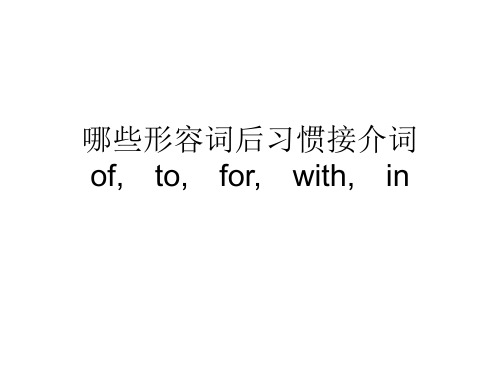
• 16)表示“厌恶”、“讨厌”、“反感”的形容词
– Abominable可恶的; antipathetic厌恶的; offensive令人讨厌的; repellent令
• 17)表示“相同”、“相等”、“相似”、“不相似”的形容词
– Analogous相似的; comparable相等的; dissimilar不相似的; similar相似的; equivalent相等的; …
• 2)表示“反对”、“反抗”、“对抗”、“对立”、“相反”、 “矛盾”的形容词
– Antipodal恰好相反的; antithetic对立的; contradictory矛盾的; contrary相反 的; cross相反的; objectionable反对的; resistant对抗的;…
• 3)表示“友好”、“不友好”、“敌对”、“好客”、“不好 客”、“热情”、“冷漠”的形容词
– Adverse不友好的; courteous有礼貌的; disrespectful无理的; respectful尊 敬别人的; friendly友好的; unfriendly不友好的; hospitable好客的; inhospitable不好客的; hostile有敌意的; impolite无礼貌的; polite有礼貌的; indifferent冷漠的; uncivil失礼的; uncourteous无理的; …
• 13)表示“典型”、“不典型”、“有特点”、“无特点”的形 容词
– Atypical不典型的; typical典型的; characteristic有特点的; uncharacteristic 无特点的;…
• 14)表示“产生”、“引起”的形容词
– Creative产生的; fertile多产的; productive产生的; provocative引起的;…
for,to,with,of之间的联系与区别以及各自用法
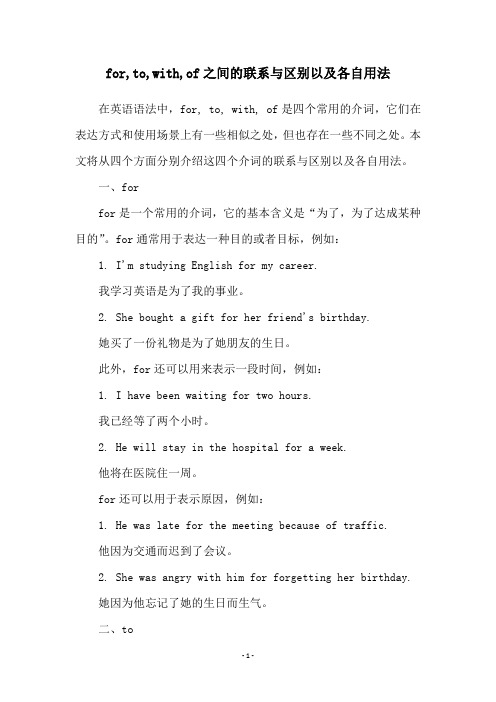
for,to,with,of之间的联系与区别以及各自用法在英语语法中,for, to, with, of是四个常用的介词,它们在表达方式和使用场景上有一些相似之处,但也存在一些不同之处。
本文将从四个方面分别介绍这四个介词的联系与区别以及各自用法。
一、forfor是一个常用的介词,它的基本含义是“为了,为了达成某种目的”。
for通常用于表达一种目的或者目标,例如:1. I'm studying English for my career.我学习英语是为了我的事业。
2. She bought a gift for her friend's birthday.她买了一份礼物是为了她朋友的生日。
此外,for还可以用来表示一段时间,例如:1. I have been waiting for two hours.我已经等了两个小时。
2. He will stay in the hospital for a week.他将在医院住一周。
for还可以用于表示原因,例如:1. He was late for the meeting because of traffic.他因为交通而迟到了会议。
2. She was angry with him for forgetting her birthday.她因为他忘记了她的生日而生气。
二、toto是另一个常用的介词,它的基本含义是“到,向,对于”。
to 通常用于表示一个方向或目标,例如:1. I'm going to the store.我去商店。
2. She is walking to the park.她正在往公园走。
to还可以用于表示一种关系或者状态,例如:1. He is married to a doctor.他和一名医生结婚了。
2. The door is open to the public.门对公众开放。
三、withwith是另一个常用的介词,它的基本含义是“和,一起,伴随”。
about,with,of,for,to用法
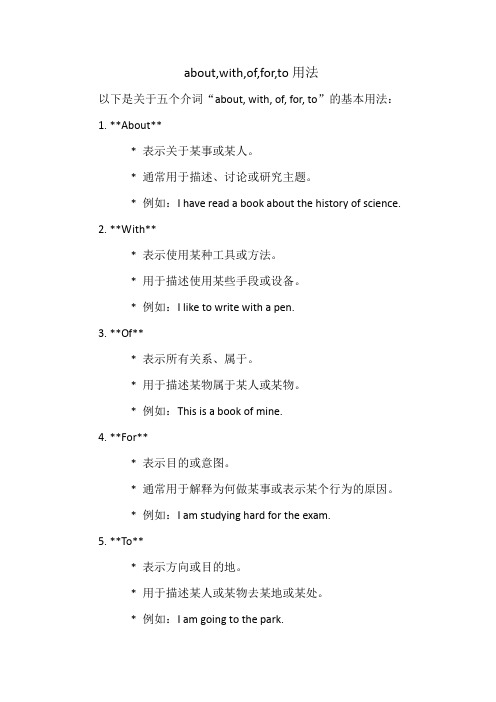
about,with,of,for,to用法
以下是关于五个介词“about, with, of, for, to”的基本用法:1. **About**
* 表示关于某事或某人。
* 通常用于描述、讨论或研究主题。
* 例如:I have read a book about the history of science.
2. **With**
* 表示使用某种工具或方法。
* 用于描述使用某些手段或设备。
* 例如:I like to write with a pen.
3. **Of**
* 表示所有关系、属于。
* 用于描述某物属于某人或某物。
* 例如:This is a book of mine.
4. **For**
* 表示目的或意图。
* 通常用于解释为何做某事或表示某个行为的原因。
* 例如:I am studying hard for the exam.
5. **To**
* 表示方向或目的地。
* 用于描述某人或某物去某地或某处。
* 例如:I am going to the park.
这五个介词的用法相当复杂,因此建议查阅英语语法书籍或咨询英语教师,以获取更详细和准确的信息。
常用的介词

常用的介词关于介词的使用,是英语学习中的一个重要部分。
介词是连接词与词之间关系的词语,常用的介词有in、on、at、to、for、with、of 等。
下面将分别介绍这些常用介词的用法。
InIn表示“在……里面”,常用于表示时间、地点、状态等。
例如:1. I am in the classroom.(我在教室里。
)2. She was born in 1990.(她出生于1990年。
)3. He is in a good mood today.(他今天心情很好。
)OnOn表示“在……上面”,常用于表示时间、地点、方式等。
例如:1. The book is on the table.(书在桌子上。
)2. We will have a meeting on Monday.(我们将在星期一开会。
)3. She goes to work on foot.(她步行去上班。
)AtAt表示“在……处”,常用于表示时间、地点、状态等。
例如:1. I will meet you at the airport.(我会在机场见你。
)2. He is good at playing basketball.(他擅长打篮球。
)3. We arrived at the hotel at midnight.(我们在午夜到达了酒店。
) ToTo表示“到……”,常用于表示方向、目的等。
例如:1. I am going to the supermarket.(我要去超市。
)2. He gave the book to me.(他把书给了我。
)3. She is looking forward to the weekend.(她期待着周末。
)ForFor表示“为了……”,常用于表示目的、原因等。
例如:1. I bought a gift for my mother.(我给我妈妈买了一份礼物。
)2. He is studying hard for the exam.(他为了考试而努力学习。
常用介词用法(for_to_with_of)
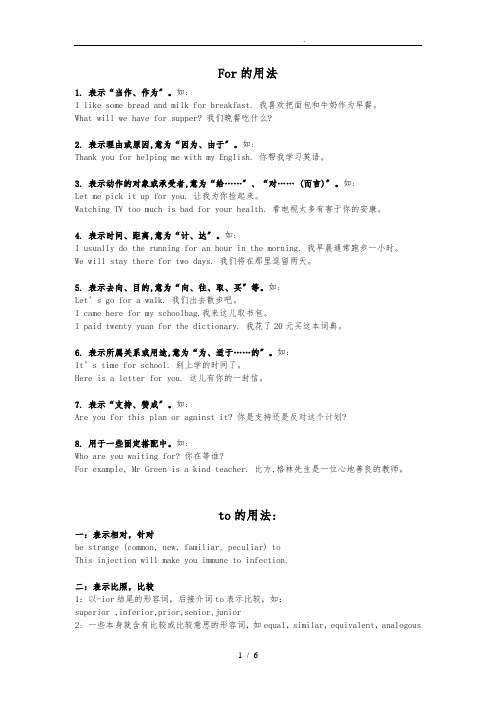
For的用法1. 表示“当作、作为〞。
如:I like some bread and milk for breakfast. 我喜欢把面包和牛奶作为早餐。
What will we have for supper? 我们晚餐吃什么?2. 表示理由或原因,意为“因为、由于〞。
如:Thank you for helping me with my English. 你帮我学习英语。
3. 表示动作的对象或承受者,意为“给……〞、“对…… (而言)〞。
如:Let me pick it up for you. 让我为你捡起来。
Watching TV too much is bad for your health. 看电视太多有害于你的安康。
4. 表示时间、距离,意为“计、达〞。
如:I usually do the running for an hour in the morning. 我早晨通常跑步一小时。
We will stay there for two days. 我们将在那里逗留两天。
5. 表示去向、目的,意为“向、往、取、买〞等。
如:Let’s go for a walk. 我们出去散步吧。
I came here for my schoolbag.我来这儿取书包。
I paid twenty yuan for the dictionary. 我花了20元买这本词典。
6. 表示所属关系或用途,意为“为、适于……的〞。
如:It’s time for school. 到上学的时间了。
Here is a letter for you. 这儿有你的一封信。
7. 表示“支持、赞成〞。
如:Are you for this plan or against it? 你是支持还是反对这个计划?8. 用于一些固定搭配中。
如:Who are you waiting for? 你在等谁?For example, Mr Green is a kind teacher. 比方,格林先生是一位心地善良的教师。
for,with,to的用法
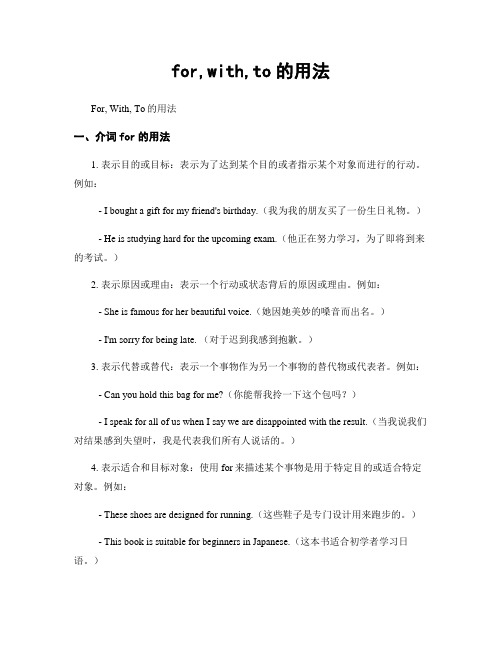
for,with,to的用法For, With, To的用法一、介词for的用法1. 表示目的或目标:表示为了达到某个目的或者指示某个对象而进行的行动。
例如:- I bought a gift for my friend's birthday.(我为我的朋友买了一份生日礼物。
)- He is studying hard for the upcoming exam.(他正在努力学习,为了即将到来的考试。
)2. 表示原因或理由:表示一个行动或状态背后的原因或理由。
例如:- She is famous for her beautiful voice.(她因她美妙的嗓音而出名。
)- I'm sorry for being late. (对于迟到我感到抱歉。
)3. 表示代替或替代:表示一个事物作为另一个事物的替代物或代表者。
例如:- Can you hold this bag for me?(你能帮我拎一下这个包吗?)- I speak for all of us when I say we are disappointed with the result.(当我说我们对结果感到失望时,我是代表我们所有人说话的。
)4. 表示适合和目标对象:使用for来描述某个事物是用于特定目的或适合特定对象。
例如:- These shoes are designed for running.(这些鞋子是专门设计用来跑步的。
)- This book is suitable for beginners in Japanese.(这本书适合初学者学习日语。
)二、介词with的用法1. 表示陪伴或伴随:使用with表示某人或某物与另一个人或物体一起出现。
例如:- I went to the park with my friends.(我和我的朋友去了公园。
)- She always goes to the concert with her husband.(她总是和她丈夫一起去音乐会。
常用介词用法(for to with of)之欧阳引擎创编

For的用法欧阳引擎(2021.01.01)1. 表示“当作、作为”。
如:I like some bread and milk for breakfast. 我喜欢把面包和牛奶作为早餐。
What will we have for supper? 我们晚餐吃什么?2. 表示理由或原因,意为“因为、由于”。
如:Thank you for helping me with my English. 谢谢你帮我学习英语。
3. 表示动作的对象或接受者,意为“给……”、“对…… (而言)”。
如: Let me pick it up for you. 让我为你捡起来。
Watching TV too much is bad for your health. 看电视太多有害于你的健康。
4. 表示时间、距离,意为“计、达”。
如:I usually do the running for an hour in the morning. 我早晨通常跑步一小时。
We will stay there for two days. 我们将在那里逗留两天。
5. 表示去向、目的,意为“向、往、取、买”等。
如:Let’s go for a walk. 我们出去散步吧。
I came here for my schoolbag.我来这儿取书包。
I paid twenty yuan for the dictionary. 我花了20元买这本词典。
6. 表示所属关系或用途,意为“为、适于……的”。
如:It’s time for school. 到上学的时间了。
Here is a letter for you. 这儿有你的一封信。
7. 表示“支持、赞成”。
如:Are you for this plan or against it? 你是支持还是反对这个计划? 8. 用于一些固定搭配中。
如:Who are you waiting for? 你在等谁?For example, Mr Green is a kind teacher. 比如,格林先生是一位心地善良的老师。
介词to for on 等用法

介词to、for、of、in、on、at、with、by、about的用法介词一般都可以接在动词之后,后接作宾语的名词。
也可以直接接宾语。
to可以跟在很多词组后面或者动词后面,表示"到..."或者“于..."例如go to someplace 和settle down to doing sth.for 一般表示“为了”例如It's not good for your health." 还可以表示直接的原因。
of是指“...的”例如:a friend of mine 翻译时有的时候也可以省略如:a cup of tea 还有很多固定词组,如:because of , kind of, handreds of , of course.in的意思是在“在...中,在...里”一般是指在某个空间里,如:I'm in a car.还可以表示穿着什么样的衣服,如:the girl in red 还可以表示“在未来的几天之内”in five days 也可以表示在某日期,如:in the year 2008 . in后常接年,月,日期,上午,下午,晚上,白天,季节,世纪等on 可以表示“在..上”的空间,如:on the desk.on后接某日,星期几,某日或某周日的朝夕,节日等,表示日期,如on Sunday.也可以表示在行进的途中,如:on the way home.另外,说树上长苹果也用on,而树上有小鸟却用in/at 可以表示“在..."如:at home, at school.有时也表示到哪里,如:arrive at .at 后常接几点几分,天明,中午,日出,日落,开始等,如at 5 o'clock.with表示“和,与”的意思,如I go there with my friend.也可以表示“带着”的意思,如:I walk in the park with my dog. He went to school by bike, with his bag in hand.还可以引导伴随状语。
常用介词用法(for-to-with-of)

常用介词用法(for-to-with-of)For 的用法1.表示“看作、作”。
如 :I like some bread and milk for breakfast.我喜把面包和牛奶作早饭。
What will we have for supper?我晚饭吃什么?2.表示原因或原因 ,意“因、因为”。
如 :Thank you for helping me with my English.你帮我学英。
3.表示作的象或接受者 ,意“ ⋯⋯”、“ ⋯⋯ (而言 ) ”。
如 :Let me pick it up for you.我你起来。
Watching TV too much is bad for yourhealth.看太多有害于你的健康。
4.表示、距离,意“ 、达”。
如: I usually do the running for an hour in the morning. 我清晨往常跑步一小。
We will stay there for two days.我将在那里停留两天。
5.表示去处、目的 ,意“向、往、取、”等。
如:Let ’ s go for a walk. 我出去漫步吧。
I came here for my schoolbag. 我来儿取包。
I paid twenty yuan for the dictionary.我花了20元本典。
6.表示所属关系或用途 ,意“ 、适于⋯⋯的”。
如:It ’ s time for school. 到上学的了。
Here is a letter for you.儿有你的一封信。
7.表示“支持、成”。
如 :Are you for this plan or against it?你是支持是反个划 ?8.用于一些固定搭配中。
如 :Who are you waiting for?你在等?For example, Mr Green is a kind teacher. 比方,格林先生是一位心地和善的老。
介词用法总结

介词用法总结介词是表示名词与其修饰成分(如名词、代词、动词等)之间关系的词类。
介词通常位于名词或代词之前,起到连接或修饰的作用。
常见的介词有:in、on、at、by、with、of、for、to、from、about、between、among等。
介词的一般用法及常见搭配有以下几种情况:1. 表示时间关系:at、in、on等- at用于具体其中一时间点,如at 7 o'clock(在7点钟),at midnight(在午夜)。
- in用于一段时间,如in the morning(在早上),in July(在七月)。
- on用于其中一天或日期,如on Monday(在星期一),on June1st(在六月一日)。
2. 表示地点关系:in、on、at等- in用于大的地区、城市、国家等,如in China(在中国),in New York(在纽约)。
- on用于小的地方或表面,如on the table(在桌子上),on the beach(在海滩上)。
- at用于特定的位置或地点,如at school(在学校),at home(在家)。
3. 表示方式、手段、工具:by、with等- by表示通过什么方式、手段得到结果,如by bus(乘坐公交车),by email(通过电子邮件)。
- with表示使用的工具或手段,如write with a pen(用钢笔写)。
4. 表示归属关系:of、to等- of表示所属关系,如the book of the teacher(老师的书)。
- to表示归属或所属关系,如the key to the door(门的钥匙)。
5. 表示原因、目的、用途:for、to等- for表示目的、原因或结果,如study for the exam(为了考试而学习),gift for you(送给你的礼物)。
- to表示目的、用途,如go to the park(去公园玩)。
for,to,with的用法
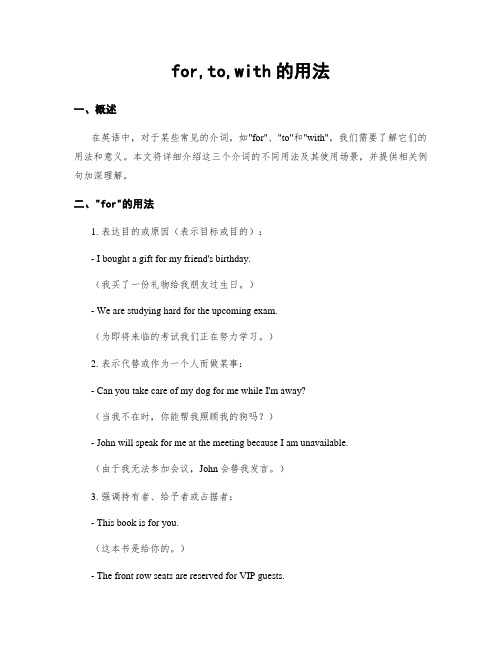
for,to,with的用法一、概述在英语中,对于某些常见的介词,如"for"、"to"和"with",我们需要了解它们的用法和意义。
本文将详细介绍这三个介词的不同用法及其使用场景,并提供相关例句加深理解。
二、"for"的用法1. 表达目的或原因(表示目标或目的):- I bought a gift for my friend's birthday.(我买了一份礼物给我朋友过生日。
)- We are studying hard for the upcoming exam.(为即将来临的考试我们正在努力学习。
)2. 表示代替或作为一个人而做某事:- Can you take care of my dog for me while I'm away?(当我不在时,你能帮我照顾我的狗吗?)- John will speak for me at the meeting because I am unavailable.(由于我无法参加会议,John会替我发言。
)3. 强调持有者、给予者或占据者:- This book is for you.(这本书是给你的。
)- The front row seats are reserved for VIP guests.(前排座位是为贵宾留着的。
)4. 表示时间段:- She has been waiting for two hours now.(她已经等了两个小时了。
)- The construction project is expected to last for six months.(预计这个建筑项目会持续六个月。
)三、"to"的用法1. 表示方向或接近某地:- I am going to the supermarket.(我要去超市。
)- He walked to the park and back.(他去了公园,然后又回来了。
语法:常用介词汇总(by,for,at,with,from,of,about,after,in,on,to)(二)

语法:常用介词汇总(by,for,at,with,from,of,about,after,in,on,to)(二)上一篇 / 下一篇 2010-11-22查看( 154 ) / 评论( 0 ) / 评分( 0 / 0 )(二)表示“地点、方向”的介词:1.in outside between, among①in表示“在……里面”,如:What’s in the box?盒子里是什么?She put her book in the desk. 她把书放进了书桌。
②outside指“在……外面”There are many people outside the room.房间外有很多人。
What did your see outside the hall? 你在大厅外看见了什么?③between在……之间(指二者)There is a hospital between the hotel and the post office.在宾馆与邮局之间有所医院。
The building stands between the park and the small river. 那栋建筑位于公园和小河之间。
between是指“在两者之间”,而among指“在多个之间”。
④among在……之间(指三者以上)“There is a thief among you.” The policeman shouted to the crowd.警察向人群喊道:“你们中间有个小偷!”He found his place among the crowd. 他在人群中找到了他的位置。
2.on, above, over, below, under(1) on在……上面,表面相互接触。
There is an apple on the table. 桌上有一个苹果。
On the top of the hill, there is a flag. 山顶有一面旗子。
[练习]常用介词用法(for_to_with_of)
![[练习]常用介词用法(for_to_with_of)](https://img.taocdn.com/s3/m/8f77d7836aec0975f46527d3240c844769eaa01d.png)
For的用法1. 表示“当作、作为”。
如:I like some bread and milk for breakfast. 我喜欢把面包和牛奶作为早餐。
What will we have for supper? 我们晚餐吃什么?2. 表示理由或原因,意为“因为、由于”。
如:Thank you for helping me with my English. 谢谢你帮我学习英语。
3. 表示动作的对象或接受者,意为“给……”、“对…… (而言)”。
如:Let me pick it up for you. 让我为你捡起来。
Watching TV too much is bad for your health. 看电视太多有害于你的健康。
4. 表示时间、距离,意为“计、达”。
如:I usually do the running for an hour in the morning. 我早晨通常跑步一小时。
We will stay there for two days. 我们将在那里逗留两天。
5. 表示去向、目的,意为“向、往、取、买”等。
如:Let’s go for a walk. 我们出去散步吧。
I came here for my schoolbag.我来这儿取书包。
I paid twenty yuan for the dictionary. 我花了20元买这本词典。
6. 表示所属关系或用途,意为“为、适于……的”。
如:It’s time for school. 到上学的时间了。
Here is a letter for you. 这儿有你的一封信。
7. 表示“支持、赞成”。
如:Are you for this plan or against it? 你是支持还是反对这个计划?8. 用于一些固定搭配中。
如:Who are you waiting for? 你在等谁?For example, Mr Green is a kind teacher. 比如,格林先生是一位心地善良的老师。
for to of with的区别

for to of with的区别
For、to、of、with的词义不同,用法不同,词源不同。
with 作介词意思有用;随着;包括;和 ... 一起。
for作介词意思有为;因为;代表;往;支持;关于;给。
作连词意思是因为。
to作介词意思有对于;为了;(表示方向)到;向;(表示间接关系)给。
作副词意思有(表示方向)去;(门)关上。
of作介词意思有关于;... 的(表所属);出身于;由于。
用法不同
1、with
with表示状态时,还可作“跟上…”“听懂…的话”解,一般用于疑问句或否定句中。
with表示关系时还可作“与…合并〔混合,组合〕”解。
2、for
for是并列连词,引导的是并列从句,表示原因的语气很弱,一般是对结果作出推断性的补充说明或解释,不表示直接原因,for前多加逗号。
for用法较正式,很少用于口语,一般用于书面语。
3、to
to表示在某范围之外,两者之间可以互相连接,也可以不连接。
4、of
of用作介词,表示在…的,在…之前;由于,因为;用...做成的;在…方面等含义;可表示同位,表示主格关系。
词源解说不同
1、with
单词直接源自古英语的wi,意为反对,对立;最初源自原始日耳曼语的withro,意为反对。
2、for
单词直接源自古英语的for;最初源自古日耳曼语的fura,意为前面,之前。
3、to
单词直接源自古英语的to,意为朝向。
4、of
单词直接源自古英语的of;最初源自原始日耳曼语的af,意为离开,分开。
with,for,to,of的用法(一)
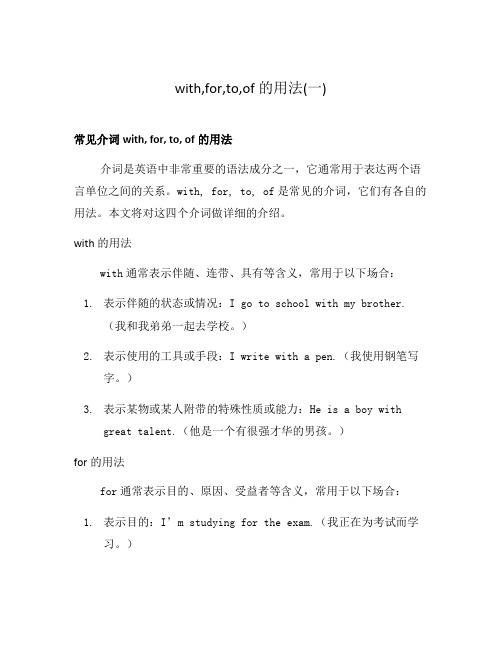
with,for,to,of的用法(一)常见介词with, for, to, of的用法介词是英语中非常重要的语法成分之一,它通常用于表达两个语言单位之间的关系。
with, for, to, of是常见的介词,它们有各自的用法。
本文将对这四个介词做详细的介绍。
with的用法with通常表示伴随、连带、具有等含义,常用于以下场合:1.表示伴随的状态或情况:I go to school with my brother.(我和我弟弟一起去学校。
)2.表示使用的工具或手段:I write with a pen.(我使用钢笔写字。
)3.表示某物或某人附带的特殊性质或能力:He is a boy withgreat talent.(他是一个有很强才华的男孩。
)for的用法for通常表示目的、原因、受益者等含义,常用于以下场合:1.表示目的:I’m studying for the exam.(我正在为考试而学习。
)2.表示原因:I’m sorry for what I did.(我为我所做的事感到抱歉。
)3.表示受益人:This present is for you.(这份礼物是给你的。
)to的用法to通常表示方向、目的地、时间等含义,常用于以下场合:1.表示方向:I’m going to the cinema.(我要去电影院。
)2.表示目的地:I’m writing an email to my friend.(我正在给我的朋友写邮件。
)3.表示时间:I’ll meet you at two o’clock.(我将于两点钟见你。
)of的用法of通常表示所属关系、产生关系等含义,常用于以下场合:1.表示所属关系:The roof of the house is made of tiles.(这个房子的屋顶是用瓦片做的。
)2.表示产生关系:I’m a friend of Tom.(我是Tom的朋友。
)以上是with, for, to, of的常见用法。
for to of with的区别
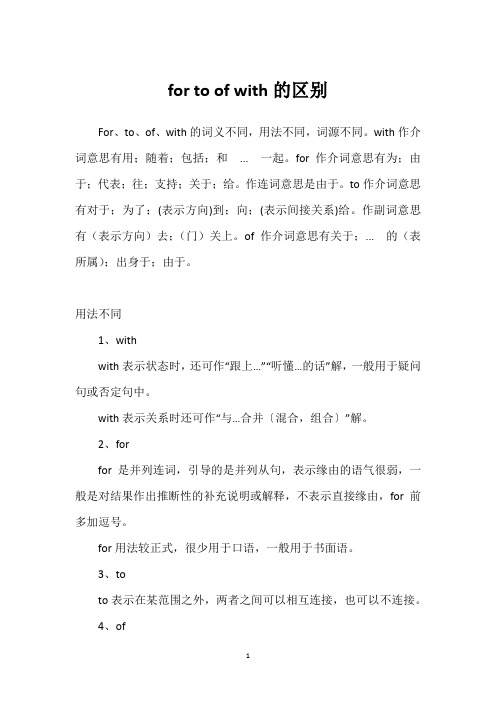
for to of with的区别
For、to、of、with的词义不同,用法不同,词源不同。
with作介词意思有用;随着;包括;和... 一起。
for作介词意思有为;由于;代表;往;支持;关于;给。
作连词意思是由于。
to作介词意思有对于;为了;(表示方向)到;向;(表示间接关系)给。
作副词意思有(表示方向)去;(门)关上。
of作介词意思有关于;... 的(表所属);出身于;由于。
用法不同
1、with
with表示状态时,还可作“跟上…”“听懂…的话”解,一般用于疑问句或否定句中。
with表示关系时还可作“与…合并〔混合,组合〕”解。
2、for
for是并列连词,引导的是并列从句,表示缘由的语气很弱,一般是对结果作出推断性的补充说明或解释,不表示直接缘由,for前多加逗号。
for用法较正式,很少用于口语,一般用于书面语。
3、to
to表示在某范围之外,两者之间可以相互连接,也可以不连接。
4、of
of用作介词,表示在…的,在…之前;由于,由于;用...做成的;在…方面等含义;可表示同位,表示主格关系。
词源解说不同
1、with
单词直接源自古英语的wi,意为反对,对立;最初源自原始日耳曼语的withro,意为反对。
2、for
单词直接源自古英语的for;最初源自古日耳曼语的fura,意为前面,之前。
3、to
单词直接源自古英语的to,意为朝向。
4、of
单词直接源自古英语的of;最初源自原始日耳曼语的af,意为离开,分开。
介词in,on.at,for.with,by,of的基本用法

介词是英语中最活跃的词类之一。
同一个汉语词汇在英语中可译成不同的英语介词。
例如汉语中的“用”可译成:(1)用英语(in English);(2)用小刀(with a knife);(3)用手工(by hand);(4)用墨水(in ink)等。
所以,千万不要以为记住介词的一两种意思就掌握了这个介词的用法,其实介词的用法非常广泛,搭配能力很强,越是常用的介词,其含义越多。
下面就简单介绍几组近义介词的用法及其搭配方法。
一. in, to, on和off在方位名词前的区别1. in表示A地在B地范围之内。
如:Taiwan is in the southeast of China.2. to表示A地在B地范围之外,即二者之间有距离间隔。
如:Japan lies to the east of China.3. on表示A地与B地接壤、毗邻。
如:North Korea is on the east of China.4. off表示“离……一些距离或离……不远的海上”。
如:They arrived at a house off the main road.New Zealand lies off the eastern coast of Australia.二. at, in, on, by和through在表示时间上的区别1. at指时间表示:(1)时间的一点、时刻等。
如:They came home at sunrise (at noon, at midnight, at ten o’clock, at daybreak, at dawn).(2)较短暂的一段时间。
可指某个节日或被认为是一年中标志大事的日子。
如:He went home at Christmas (at New Year, at the Spring Festival, at night). 2. in指时间表示:(1)在某个较长的时间(如世纪、朝代、年、月、季节以及泛指的上午、下午或傍晚等)内。
of for to with的用法简单易懂

Of, for, to, with的用法英语中的介词有很多种,其中of, for, to, with是使用频率较高的介词。
它们的用法有很多种,下面将详细介绍它们的用法。
一、of的用法1. 表示所属关系例如:The book of John. (约翰的书)2. 表示材料例如:A cup of tea. (一杯茶)3. 表示内容例如:A book of poems. (一本诗集)4. 表示数量例如:A group of people. (一群人)5. 表示时间例如:The month of June. (六月份)二、for的用法1. 表示目的例如:I bought a new phone for my mother. (我给我妈妈买了一部新手机)2. 表示代替例如:I will do it for you. (我会替你做这件事)3. 表示时间例如:I have been waiting for you for an hour. (我已经等你一个小时了)4. 表示原因例如:I am happy for you. (我为你感到高兴)三、to的用法1. 表示方向例如:I am going to the park. (我去公园)2. 表示目的例如:I am studying hard to get a good job. (我努力学习是为了找到一份好工作)3. 表示时间例如:I will meet you at 8 o'clock. (我会在8点钟见你)4. 表示比较例如:I prefer tea to coffee. (我喜欢茶胜过咖啡)四、with的用法1. 表示伴随例如:I went to the cinema with my friends. (我和我的朋友一起去看电影)2. 表示使用工具例如:I cut the meat with a knife. (我用刀切肉)3. 表示方式例如:He spoke with a smile. (他微笑着说话)4. 表示原因例如:I am angry with you. (我生你的气)以上就是of, for, to, with的用法。
- 1、下载文档前请自行甄别文档内容的完整性,平台不提供额外的编辑、内容补充、找答案等附加服务。
- 2、"仅部分预览"的文档,不可在线预览部分如存在完整性等问题,可反馈申请退款(可完整预览的文档不适用该条件!)。
- 3、如文档侵犯您的权益,请联系客服反馈,我们会尽快为您处理(人工客服工作时间:9:00-18:30)。
For的用法1. 表示“当作、作为”。
如:I like some bread and milk for breakfast .我喜欢把面包和牛奶作为早餐。
What will we have for supper? 我们晚餐吃什么?2. 表示理由或原因,意为“因为、由于”。
如:Thank you for helping me with my English. 谢谢你帮我学习英语。
3. 表示动作的对象或接受者,意为给……”、对……(而言”如:Let me pick it up for you. 让我为你捡起来。
Watchi ng TV too much is bad for your health.看电视太多有害于你的健康。
4. 表示时间、距离,意为“计、达”。
如:I usually do the running for an hour in the morning.我早晨通常跑步一小时。
We will stay there for two days. 我们将在那里逗留两天。
5. 表示去向、目的,意为“向、往、取、买”等。
如:Let ' s go for a wal我们出去散步吧。
I came here for my schoolbag我来这儿取书包。
I paid twenty yuan for the dictionary. 我花了20 元买这本词典。
6. 表示所属关系或用途,意为为、适于……的”如:It ' s time for scho到U上学的时间了。
Here is a letter for you.这儿有你的一圭寸信。
7. 表示“支持、赞成”。
如:Are you for this plan or against it? 你是支持还是反对这个计划?8. 用于一些固定搭配中。
如:Who are you waiting for? 你在等谁?For exa mp le, Mr Green is a kind teacher比如,格林先生是一位心地善良的老师。
尽管for 的用法较多,但记住常用的几个就可以了。
to的用法::表示相对,针对be strange (common, new, familiar, peculiar toThis injection will make you immune to infection.二:表示对比,比较1:以-ior结尾的形容词,后接介词to表示比较,如:su perior ,in ferior, prior,se niorju nior 2: 一些本身就含有比较或比拟意思的形容词如equal,similar,equivalent,analogousA is similar toB in many ways.3:表示一些先后顺序的形容词,如:seco nd n ext, 4: to也偶尔出现在个别动词之后,与动词形成固定词组,表示比较,如:preferto,compare to,in contrast tocompare to sth表示比喻或比拟,而compare with sth表示比较,女口:World is usually compared to a stageCompared with his past,he has changed a lot.Prefer的正确句型是:prefer A to B 或prefer doing A to doing B,但当prefer 后接动词不定式时,表示比较的介词to就要改成rather than如:The undaunted soldier preferred death to surrender.Many people prefer spending money to earning money.They prefer to pursue careers rather than remain home as house wives.5: to与及个别的名词构成比较之意,如:alternativeGoing to an under water concert is a great alternative to going to dinner.三: 表示修饰关系1:表示回复,反应意思的词,如:answer to question, solution to problem,response to inquiry,reaction to proposal,reply to letter6:表示与书籍,文本相关的词,如:introduction to passage.7: 表示恭喜或是祝贺,如:The director proposed a toast to the health of the guests.Let 's drink to Dick 's success in business8: 另外还有一些名词符合这种用法,有的具有两者息息相关,缺一不可的含义.如:key to door,invitation to party,四:to还具有依据伴随,和着节奏的含义,如:si ng to pia no, cha nee to the tune, stamp to the rhythm of the song, add salt to taste(一:表示相关联,相连接,女口:be related to,be relative to,in relation to ,link toInvestigate all the facts related to the problem.People often linked walth to happiness.(二:表示反对和赞同。
1:to引导的表示反对,抗拒,对抗意义的词组。
Be opposed to,be oppsist to,be contrary to,be adverse to,be resistant to ,object to,oppose to,2: to引导的表示同意,赞同意义的词组:consent to,subseribe to,The employer consented to give him a salary raise.表示调整,使符合,使适应的含义,如:adapt to,commodate to, adjust to,conform to,habituate to,fit to,suit to,correspond to,cater toShe tried to habituate herself to the style of plain living.Your action should conform to the interests of the people.3:表示投降,屈服,服从的含义,女口:be subject to,be subord in ate to,submit to,subject to,surrender to,give in to,confess to,admit to.The mi nority is subord in ate to the majority 少数服从多数五:表示趋势或倾向如:tend to,be prone to,be inclined to,be apt to,be liable to He liable to seasickness.You are liable to come to wrong conclusion.七:表示约束,局限,如:limit to,confine to,resrict toHe's confined to the house by illness.He confined his remarks to scientific mangement.八: 表示一种习惯或是一种适应性,如:get (be to,used to,Finally,the students got used to my teaching method.九: 表示起因和原由,如:owing to,due to,thanks to,attribute to,come down toThe flight was cancelled due to the thick fog.The famous artist attributed his success to his wife.十: 表示目的或结果,如:aim to,lead to,give rise toI aim to be an excellent college teacher.His conceit lead to his failure.十二:表示数量上的积累或增加,如:in addition to,add to,amount toIn addition to relief supplies,he also presented with some money.十三:表示全身心投入的含义,女口:be addicted to,c on tribute to,devote to,commit toHe is determined to devote all his life to his.十四:表示展望或是回顾,如:look forward to反date back toThe church dates back to the 13th century.十五:表示方位概念.如:close to,next toI don 't like wool next to my skin.十七: 表示有关注,关于: as to,with regard to十八:表示关注或重视,女口:pay attention to,attach to,We should attach primary importance to job training.二十: 表示应该或必须含义的句式, 如:I t ' s time to get up.We are supposed to get here at seven.It ' s up to this country to ban nuclear weapons.常用词组res pond to 反应,app eal to(吸弓丨,catch on to理解,liste n to (收听,used to 过去常常, give birth to,attend to(照料, see to负责,be entitled to有权,belong to(属于, come to苏醒,sta nd up to勇敢面对,he Ip on eself to请青自便,refer to,to the poi nt (切题,with 的用法1、以, 用, 同...,由于, 和...一致, 赞成, 关于, 就talk with a friend 与朋友谈话learn farmi ng with an old p easa n跟老农学习种田fight [quarrel, argue] with sb. 跟某人打架[争吵, 辩论]2、说明表示动作的词, 表示伴随] 随着, 和...同时cha nge with the temp erature随着温度而变化in crease with years逐年增力卩be up with the daw n 黎明即起W-these words he left the room.他说完这些话便离开了房间。
